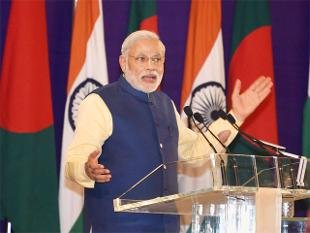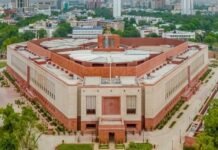New Delhi, Mar 5: India is set for a quantum leap in infrastructure and concerted efforts are being made to bolster growth in highways, I-ways and railways, Prime Minister Narendra Modi has said.
Launching an ambitious Rs 50,800-crore Setu Bharatam project to ensure highways without railway crossings by 2019 and overhaul of 1,500 British-era bridges, the Prime Minister said his government is committed to speeding up all projects related to infrastructure.
“Our endeavour is for a quantum jump (in infrastructure), for a breakthrough, for fast-tracking projects. Infrastructure plays the same role for the nation as arteries play in a human body and thus, making it sound is quintessential,” Modi said at the launch.
Lauding Road Transport and Highways Minister Nitin Gadkari for “pioneering work” in infrastructure, Modi said infrastructure plays a pivotal role in the country’s growth and a comprehensive integrated approach has been initiated.
He added that the government’s emphasis is not just on “highways, but on I-ways (Information ways) and railways”.
Normally, governments are in the habit of doing incremental work only, but the approach of the current one is different, Modi asserted, adding that it is driven by long-term growth and is working to satisfy the long-felt aspirations of people.
Under the Setu Bharatam project, a total of 208 railway crossings will be replaced by rail over bridges (ROBs) by 2019 at an estimated cost of Rs 20,800 crore while 1,500 bridges of the British era will be overhauled at an estimated expenditure of Rs 30,000 crore across the country.
The Prime Minister said that for the first time all bridges in the country are being mapped, in an oblique reference to the previous administration for not having any such database in place.
The Indian Bridge Management System has been introduced to map all 1,50,000 bridges in the country.
Modi, in his trademark style, added: “Nobody knows which bridge is where. Imagine how works were being done. I am not blaming any elected body for this or any Prime Minister or ministers. This is the flaw of the system. We didn’t accord priority to these things…”
In a first, he said, gradation of bridges is being done through space technology with information like age, longitude, latitude, length, material and design.
Modi singled out the previous land acquisition system for highways, saying expansion of projects to two lanes and four lanes was not possible due to rampant encroachments, which were allowed with an eye on elections.
“Road length was not increasing due to encroachments. Now, we are acquiring land in such a fashion that there are enough provisions for expansion in between. Small things matter,” the Prime Minister said.
He also took jibes at the lengthy “exchange of letters” between ministries of highways and railways in the previous government for any rail or road bridge.
“Railways and road exchanged so much papers that at times it was felt that all papers could construct a monument bridge,” he said, in a lighter vein.
“The government is also working on plans to provide basic facilities like rest rooms at a gap of 20-25 km, besides ensuring rural people sell their produce at centres near highways. It’s laying special emphasis on constructing rural roads under the Pradhan Mantri Gram Sadak Yojna besides augmenting the existing rail and digital fibre network, agriculture infrastructure, electricity and grid connectivity,” he said.
He spoke of “massive reforms” in the Railways, “unlike in the past when new train announcements were done regularly to please particular parliamentarians”.
“There are a number of such announcements which could not be translated into reality,” Modi said.
He also underscored the need for research by young engineers and architects in the field of bridges.
Gadkari said the objective behind Setu Bharatam is to make all National Highways free of railway level-crossings by 2019.
“This is being done to prevent frequent accidents and loss of lives at level-crossings,” the minister said and added that out of the proposed 208 ROBs, 33 will be in Andhra Pradesh, 20 Bihar, 11 Jharkhand, 17 Karnataka and 22 West Bengal.
Detailed project reports have already been received for 73 ROBs, of which 64 are likely to be sanctioned soon.
In addition, about 1,500 old and worn-down bridges will be overhauled at a cost of about Rs 30,000 crore.
The government, the minister said, is committed to completing the eastern and western bypass projects in 400 days to make Delhi congestion-free.
Gadkari expressed his anguish that out of the 52 lakh km of road network, the length of National Highways is barely 96,000 km despite the fact that it carries 40 per cent of the total traffic.
The highways ministry is committed to expanding Nattional Highways network, he said.




























